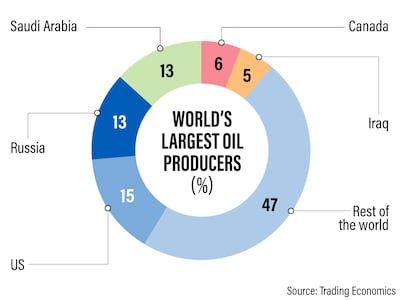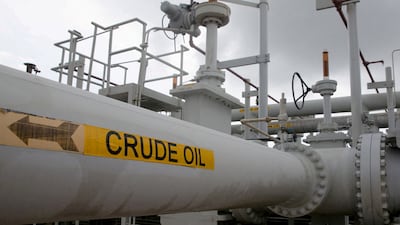The US will start releasing 1 million barrels of oil a day from its strategic petroleum reserve (SPR) over the next six months, as the world's largest oil producer seeks to rein in soaring inflation and lower crude prices.
The move represents the largest release since the SPR was set up after the 1970s oil embargo.
Following the news, Brent, the global benchmark for two thirds of the world's oil, was down 4.65 per cent at $108.17 per barrel at 7.10pm UAE time on Thursday. West Texas Intermediate, the gauge that tracks US crude, was trading 4.06 per cent lower at $103.44 a barrel. In early trading on Friday both futures edged lower with Brent trading at $104.30 and WTI trading at $99.63.
"The scale of this release is unprecedented: the world has never had a release of oil reserves at this 1 million per day rate for this length of time," the White House said in a statement on Thursday.
"This record release will provide a historic amount of supply to serve as bridge until the end of the year when domestic production ramps up. The Department of Energy will use the revenue from the release to restock the SPR in future years. This will provide a signal of future demand and help encourage domestic production today," it said.
The decision to roll out crude stockpiles comes as President Joe Biden faces the lowest approval rating of his presidency (40 per cent), according to the latest Reuters/Ipsos poll, stalled nuclear negotiations with Iran and the US seeking to control inflation that hit a 40-year high.
President Biden and his Democratic party have been criticised by rival Republicans because of the rising costs and high oil prices in the advent of the 2022 Midterm Election, the first national election since Donald Trump was defeated. Control of both chambers of Congress and dozens of governorships and state offices are on the line.
The move marks the third time the country has tapped into its strategic reserves in the past six months, following 50 million barrels released in November 2021 and 30 million barrels in March 2022 as part of the pledge by International Energy Agency members to unload 60 million barrels from emergency stocks to stabilise energy markets.
Here is a rundown on the potential impact of the US releasing crude stockpiles on oil markets and why it matters.
Why is the US releasing additional oil barrels?
The US, which is also the world's largest oil consumer, has been hit hard by inflation after a sharp increase in energy prices this month because of Russia's war in Ukraine.
Oil prices climbed to almost $140 per barrel earlier this month, a 14-year high, after the US banned Russian oil imports to penalise Moscow for its military invasion in Ukraine and the UK said it would phase out imports of Russian crude during the course of the year. While prices have since declined, they remain highly volatile as supply struggles to catch up with rising demand.
Consumer inflation in the US touched 7.9 per cent in February, a 40-year high, as gas, food and housing prices soared across the country. The figure doesn't include the oil price surge witnessed earlier this month.
With pay raises not keeping pace with inflation, consumers are struggling to manage and have curbed spending, which is also severely affecting small businesses. This has dampened support for President Biden and congressional Democrats as they approach the midterm elections in November.
To address the situation, the US Federal Reserve raised interest rates by 25 basis points earlier this month, with several more rises expected to follow.
But the Biden administration is under pressure to take more steps, which is likely to have prompted the move to release more oil into the market and reduce fuel prices.
The additional supply of US crude could “help compensate for the relative inaccessibility of Russian crude as bilateral, multilateral and self-imposed sanctions by firms prevent dealing in cargoes from the country”, Edward Bell, a senior director of market economics at Emirates NBD, said.
The move also comes after today’s Opec+ meeting, where the producers’ alliance proceeded with its monthly production increase to 432,000 barrels per day in May from 400,000 bpd.
The US' move "may affirm the view of Opec+ ministers that oil market conditions do not warrant additional output from them at this point”, Mr Bell said.
Nuclear negotiations with Iran have also stalled over Washington's reluctance to remove sanctions on the Iran Revolutionary Guard Corps and their classification as a terror organisation. Iran, a member of Opec, would have added 1 million bpd of supply to the market had a deal been agreed.

How did markets react to the news?
Following the first news reports about the US' move late Wednesday, global oil prices reversed an upward trend and plunged by more than $5 a barrel.
They continued the downward trend on Thursday, after the decision was confirmed.
“Despite falling oil prices ... the medium-term outlook remains positive on the back of a tight supply and rising demand," said Ipek Ozkardeskaya, a senior analyst at Swissquote Bank.
The release of stockpiles by the US may not be substantial enough to materially lower prices, as petrol prices in the US are closely correlated to international oil benchmarks than to domestic ones, Mr Bell said.
“Running down inventories when the oil market may be moving into a structural deficit with no certainty on how or when stockpiles can be replenished could add another supporting force to oil prices in the medium term,” he said.
Even over a six-month period, the SPR release "wouldn’t be enough to compensate for what is appearing to be a material disruption to Russian crude flows", he added.
What additional measures could we see?
IEA member countries are planning to meet on Friday to decide on a further collective oil release, according to reports.
The agency said last week that its members were ready to release more oil into the market “if needed” to tackle soaring prices. IEA member countries have committed to releasing 61.7 million barrels of oil reserves as of March 4.
The release constituted only 4 per cent of the total storage of the IEA's member countries, which includes 31 countries, IEA executive director Fatih Birol said.
“If our countries decide [that] there is a need, we will be happy to immediately act and bring the volumes to the market.”
Why does it matter?
Oil prices are up by about 68 per cent from the same period last year, due to the Russia-Ukraine conflict as well as a faster-than-expected economic recovery and also years of underinvestment in the energy industry after prices collapsed in 2014, which restricted the output capacity of some producers.
The war in Ukraine has shaken markets further and the surge in energy prices could send the global economy into a recession.
Net oil importing countries are affected the most by the surge in crude prices, with poorer countries likely to take on more debt, run fiscal deficits, face higher food costs and potentially the risk of social unrest. A deterioration in the balance of payments may push some countries to seek assistance from the International Monetary Fund.
Balancing the market is crucial to ensure that energy prices stabilise in the short-term, in turn reducing inflationary pressures and helping consumers and economies continue to recover from two years of a pandemic-induced slowdown.

